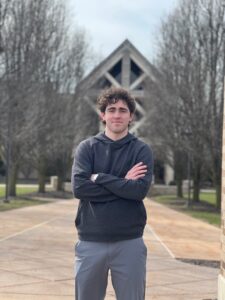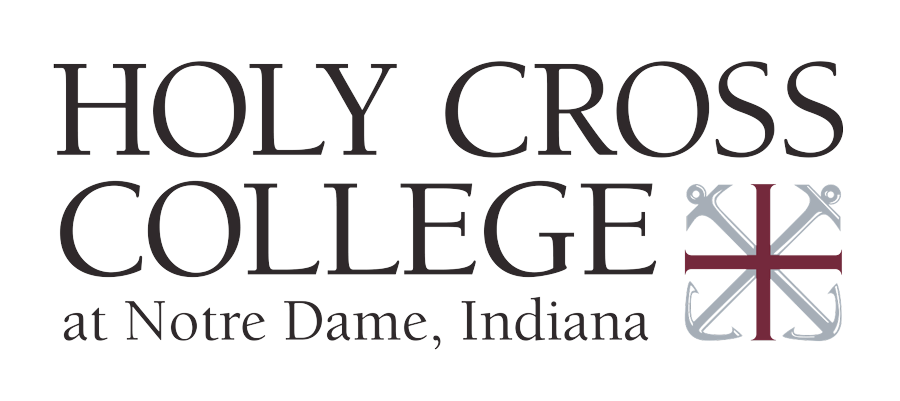
Liam Redmond arrived at Holy Cross College on a scooter in late March and a wave of nostalgia hit him.
Three years ago, he came to Holy Cross through the Gateway Program, an academic partnership that allows select students to begin their studies at Holy Cross before transferring to the University of Notre Dame. Like many in the program, Redmond had his sights set on Notre Dame from the start. But what he did not realize was that the smaller Holy Cross just across the road would be where his entrepreneurial journey truly began.
Now twenty-two, two months from graduation at Notre Dame, and named to Forbes’ 30 Under 30, Redmond is the co-founder of Yelo, a student-run social ride networking platform that is outpacing Uber on multiple college campuses. The company has quickly expanded to fifteen schools, reaching over 100,000 students, while he is still finishing his Notre Dame degree. But long before investor meetings and national recognition, Yelo was just an idea—one that took shape in the unique environment of Sigfried Dining Hall and Basil Hall at Holy Cross College.
A Small School, A Big Idea
Redmond’s startup journey began not in a corporate incubator, but in a small dorm room at Holy Cross. Unlike the sprawling lecture halls of Notre Dame, Holy Cross’ tight-knit atmosphere gave him a sense of community that proved critical in his early days as a founder.
“I had always kind of grown up wanting to go to Notre Dame,” Redmond said. “My mom went to ND, I had a bunch of cousins that went as well, and it was always a lifelong dream. So of course, I got my admissions letter that said, ‘Hey, listen, we think you’d be great, but do the Gateway Program first.’ I had never really heard of Holy Cross, to be honest.”
The Gateway Program is not something students can apply for; rather, they are invited based on their Notre Dame application. The program is intentionally small, ensuring personalized attention and one-on-one advising. Gateway students take the bulk of their courses at Holy Cross while enrolling in select classes at Notre Dame. The goal is to prepare them for a seamless transition to Notre Dame after their first year, but for many—like Redmond—the experience at Holy Cross leaves a lasting impact.
Like many Gateway students at Holy Cross, Redmond quickly discovered that its small size was a plus. “One of the huge advantages early in my college career was not being thrown into this massive environment like Notre Dame.”
The first kernel of Yelo came from a simple but frustrating experience: paying for Ubers. South Bend is not a city known for its public transportation, and students frequently rely on ride-sharing apps to get downtown. But the costs were steep—often $30 or more for a short ride. Redmond noticed an informal system already in place: upper-class students driving younger students for a few bucks.
“I kept writing down problems in a journal,” Redmond said. “One of those problems that I kept writing down was how much we were spending on rideshares, Ubers into downtown—whether it was for coffee, a concert in town, or whatever.”
It was an obvious inefficiency, but one that no one had formalized into a scalable business. At Holy Cross, he had the space to start tinkering with the idea. “We literally had a kid at Holy Cross who would drive us downtown and we’d pay him like five, ten bucks rather than Uber, which was like 30 to 35 at the time,” he said. “It made me think—could we almost scale up this operation?”
 The Unexpected Key to Success: Holy Cross Students
The Unexpected Key to Success: Holy Cross Students
Once he launched the project at Notre Dame following his time in the Gateway Program,Redmond assumed his biggest user base would be Notre Dame students. After all, it was the bigger school, with more students needing rides. But when he started recruiting drivers, he discovered something surprising—Holy Cross students were uniquely suited to make the business work.
“We noticed that students there were signing up to drive at a much higher clip than they were at Notre Dame,” Redmond explained. “Holy Cross had a ton of local kids who all had cars. You do not have that at Notre Dame. And kids there were really driven to go out and earn.”
One Holy Cross student, Michael Miller, became Yelo’s top driver. “Michael’s just constantly driven to make money,” Redmond said. “That is his real focus, and that kind of kid is rare. But when you get them a taste of ‘Hey, this is what it could be,’ then they’re immediately hooked on the mission.”
That student-driven hustle helped Yelo gain traction and Redmond and his partners refined their business model. Investors took notice.
Scaling Up—And Leaving the College Bubble
At this point, Redmond’s casual startup is no longer just a college experiment. Yelo is proving to be a viable alternative to Uber, particularly in college towns where students valued affordability and safety over brand recognition.
“The biggest breakthrough wasn’t just offering cheaper rides,” Redmond said. “We realized we were actually influencing where students were going. We were taking the top commercial addresses each night and showing them back to riders. Students started making their decisions about where to go based on what was trending.”
That shift made Yelo not just a social ride networking app but a marketing platform. Businesses began paying to promote their locations, and Yelo found a new way to generate revenue beyond ride fares.
Now operating in multiple states, Yelo is at a turning point. Redmond, now a part-time student at Notre Dame to accommodate his startup’s growth, has spent the last year juggling board meetings, software development, and expansion plans. But through it all, he still credits his time at Holy Cross as a defining point in his journey.
 The Holy Cross Factor
The Holy Cross Factor
Holy Cross College has more than half a century of being a leader in social mobility thought amongst higher education. But Redmond’s story reflects something larger: Holy Cross is not just a stop on the way to something bigger, it is a launching pad.
It was at Holy Cross that Redmond found the collaborators to develop ideas without the overwhelming pressures of a massive university.
It was Holy Cross students who became among his first pool of drivers and test users. And it was the school’s culture—one that fostered close relationships and entrepreneurial thinking—that gave him the foundation to take risks.
“I thought Holy Cross was just a path to Notre Dame,” Redmond said. “But looking back, it was the place that gave me my direction — and the courage to chase it.”

